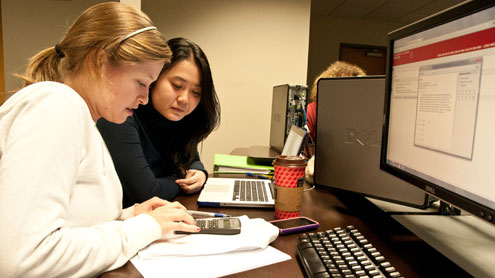Haley Wilson, a junior majoring in political science, is familiar with the mental and emotional strain that come with finals. But this semester, the stress of finals is higher than ever. Though only in her third year at UA, Wilson will graduate in the spring and she is feeling the pressure.
“Finals are really stressful this semester because it is the last semester that will go on my transcripts for grad school,” Wilson said. “I’m going to have to prepare more than ever.”
Graduating students like Wilson are not the only ones caught in the stress of finals. First year students to sixth year students are preparing for the often-dreaded finals next week. Fortunately, there are things all students can do to make the most of their study time.
Delynne Wilcox, assistant director of Health Planning and Prevention at the Student Health Center, said it is important to stay focused and have a plan when studying.
“Do not let panic and crisis mode take over,” Wilcox said. “Look at the grades you have and figure out where you need to spend more time studying based on your basis of knowledge in each subject. You don’t have to spend the same amount of time studying for each class. Gauge your grade situation in each class to best manage your time.”
Psychology professor Stan Brodsky said it is important for students to remember basic health maintenance during exam time.
“Students should do the obvious things,” Brodsky said. “They should exercise regularly, eat well and attend to their sleep needs. They should take regular breaks and stretch.”
Margaret Bishop, a senior majoring in public relations and communication studies, is account executive for the Prescription Drug Awareness campaign. The campaign will be providing healthy tips for finals from their Twitter @PDAcampaign. Bishop agreed sleep is crucial to success.
“Sleep, even if it’s only four to five hours,” Bishop said. “It is important to recharge your brain.”
Wilcox said it is important to practice good nutrition to maintain energy.
“You think you’re hungry because your body needs energy, and the easy things to reach out to are junk foods that are salty and sugary,” Wilcox said. “The sugary foods especially give you a quick burst of energy but then a crash. Balance protein intake with carbs so your energy level is sustained.”
Brodsky said students should keep energy up using healthy methods.
“If students are already on an exercise regimen, they should keep it up,” Brodsky said. “Do not try new chemical aids to alertness. Finals are not a time to experiment.”
Wilcox also warns against large amounts of caffeine.
“The main ingredient in things like energy drinks, which are often marketed as healthy drinks, is caffeine,” Wilcox said. “They keep the body awake, but that doesn’t mean you are learning anything. They keep you alert but don’t give you energy.”
Brodsky said it important for students to take breaks during long periods of studying.
“Students should not push themselves excessively,” Brodsky said. “Many people reach a point of diminishing returns from long periods of unbroken studying. When they reach that point, they should break up their studying time. It is useful to have a stopping time in advance, because it keeps students focused on what they need to get done.”
Wilcox agreed taking time to be less serious is important for effective studying.
“Laughter is a key component in managing stress and improving your mood,” Wilcox said. “Think of funny things to expose yourself to when you’re taking study breaks.”









